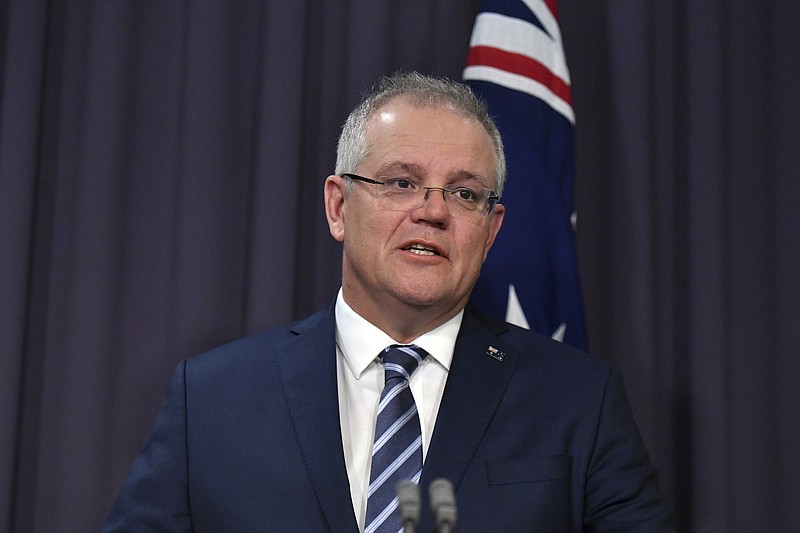CANBERRA, Australia -- "A sophisticated state-based cyberactor" was targeting Australia in an escalating campaign that is threatening all levels of government, businesses, essential services and critical infrastructure, the prime minister said Friday.
Prime Minister Scott Morrison would not name the state, amid inevitable speculation that the cyberattacks were part of Australia's rift with China.
Morrison said he made the growing threat public at a news conference to raise awareness and particularly wanted organizations involved in health, critical infrastructure and essential services to bolster technical defenses.
A range of sectors were being targeted, and the frequency of cyberattacks to steal and cause harm has increased for months, he said.
"This is the actions of a state-based actor with significant capabilities. There aren't too many state-based actors who have those capabilities," Morrison said.
Peter Jennings, executive director of the Australian Strategic Policy Institute think tank, said only China had the capability and interest in launching such a major cyberattack against Australia.
"I'm absolutely certain that China is behind it," Jennings said.
Morrison said the issue was constantly raised with Five Eyes intelligence partners and that he briefed U.K. Prime Minister Boris Johnson on the matter Thursday night.
Chinese Foreign Ministry spokesperson Zhao Lijian dismissed such allegations, saying China has "been opposing and combating all types of cyberattacks."
"The attacks coming from institute against China are totally baseless nonsense," Zhao told reporters at a daily briefing Friday.
China in recent weeks banned beef exports from Australia's largest slaughterhouses, ended trade in Australian barley with a tariff wall and warned its citizens against visiting the country. The measures are widely interpreted as punishment for Australia's advocacy of an independent probe into the origins and spread of the coronavirus pandemic.
Australia's foreign minister this week accused China of using the anxiety around the pandemic to undermine Western democracies by spreading disinformation online, prompting China to accuse Australia of disinformation.
During his news conference, Morrison was asked how he would respond to speculation that China could be behind the recent rise in attacks, particularly in light of escalating tensions between the two nations.
Morrison said "Australia doesn't engage lightly in public attribution," but said he couldn't control speculation about who was responsible for the campaign.
He offered few details about the activities and said it was difficult to understand whether the intrusions were motivated by desires to steal state secrets, intellectual property or the personal data of ordinary people.
Australian investigations had not uncovered any "large-scale personal data breaches," Morrison said. And he said many of the intrusions had been thwarted.
Defense Minister Linda Reynolds said the government's cyberagency, Australian Cyber Security Center, and the Home Affairs Department published a technical advisory on how organizations can detect and mitigate cyberthreats.
The agency warned last month that "malicious cyberadversaries" were taking advantage of key staff at critical infrastructure working from home during the pandemic.
Power and water networks as well and transport and communications grids were threatened.
"We are continuing to see attempts to compromise Australia's critical infrastructure," agency head Abigail Bradshaw said.
"It is reprehensible that cybercriminals would seek to disrupt or conduct ransomware attacks against our essential services during a major health crisis," she added.
The agency also reported that "malicious cyberactors" were attempting to "damage or impair" hospitals and emergency response organizations outside Australia.
Sydney-based brewery giant Lion said Friday it was continuing to recover from a ransomware attack last week.
Information for this article was contributed by Rod McGuirk of The Associated Press; and by Edward Johnson of Bloomberg News.

